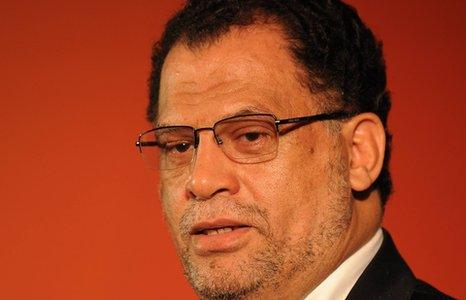Jordaan needs change of strategy
- Published

Jordaan was the architect of the 2010 World Cup in South Africa
"A principled man has but to stand his ground and the world will yet come round to him," Britain's war time leader Winston Churchill was once supposed to have said.
This is an adage that appears to have been taken to heart by Danny Jordaan, the architect of the 2010 World Cup.
Much to his cost so far.
Since masterminding Africa's first ever World Cup, Jordaan has been itching to enter football's corridors of power.
However, negotiating his way through the murky world of football politics has proved to be anything but a walk in the park.
Friday's withdrawal from the race to become president of southern Africa's regional body, Cosafa, is the second bitter pill that his supporters have had to swallow this year.
In February, the 59-year-old administrator stood for election to the Fifa executive committee and was soundly beaten in Khartoum, Sudan.
For a man hailed as the brains behind the 2010 World Cup, his failure to reach the top administrative echelons of the game has left many people scratching their heads.
Jordaan's football credentials are beyond dispute, and his administrative skills have been tested in various spheres in his country and beyond.
He also has first-class media relations and is seen as a safe pair of hands by some of the game's biggest sponsors on the continent.
So why is he failing?
For a start, the former anti-apartheid activist faces one significant challenge; he is viewed outside South Africa as aloof and, at worst, arrogant.
The fact that he was the central plank for the 2010 World Cup, whilst a great thing to have on his CV, does not excite African football administrators enough to vote for him.
"I have no problem with his message of change but what I won't accept is a person who attempts to advance his career by telling us that we're fools," one administrator told me on condition his name remains anonymous.
"It's scandalous that a man of his stature is kept out of football administration, but the man has very few friends in African football," said another long-standing administrator, again speaking on condition I keep his identity a secret.
"We know he's a favourite of some people at Fifa but those people at Fifa don't vote in Africa," he added, alluding to the widely-held view that Fifa president Sepp Blatter is very keen to see Jordaan in play a leading role in Africa.
Jordaan has argued, quite rightly in my view, that he needs to change the debate if he is going to change the way football is run, both at regional and continental level.
He has spoken at length about what he intends to do differently if elected into office and not many doubt his ability to deliver.
But is anyone listening?
Given that his name tends to generate outright hostility in many parts of the continent, a charm offensive from Cape to Cairo is essential.
This is because there is one basic tenet of life: if people do not like you as a person, it follows that they are less likely to respond positively to what comes out of your mouth.
Jordaan also has to appreciate the fact that many of his opponents have no strategy for solving African football's biggest problems - they just have strategies for winning elections, which is not the same thing.